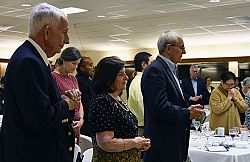Dinner recognizes Diocesan Development Drive workers

SALT LAKE CITY — Members of the laity who are involved with the Diocesan Development Drive throughout the diocese gathered with their parish priests in the cafeteria of Blessed Sacrament School to celebrate the closing of the annual DDD appeal, which funds the various ministries of the local Church.
“The DDD is essential to the function of the diocese; without you we would not be able to do what we do,” said John Kaloudis, director of the DDD and the diocese’s Office of Stewardship. He also thanked those gathered for the “wonderful, wonderful work that you do.”
The DDD provides resources so that the various ministries of the diocese can continue to serve the local Church, said Bishop Oscar A. Solis in his remarks at the dinner.
Among those ministries are the Office of Vocations, which includes the formation of the nine young men who are seminarians for the diocese, and the Office of Youth and Young Adult Ministry, which helps parishes provide spiritually for their young people.
The Office of Hispanic Ministry also benefits from the DDD. Maria Cruz Gray, director of this office, spoke at the dinner about its history and mission.
Bishop J. Lennox Federal created the Diocese of Salt Lake City’s Office of Hispanic Ministry in 1972 in response to the influx of Hispanic Catholics to Utah. Since then, members of the office “have been working tirelessly … in making them feel welcome in their new land” and “have explored the many ways to better serve our Hispanic brothers and sisters and their families,” Gray said.
Local Catholics have been part of the Encuentro movement from the beginning, joining other Hispanics nationwide in seeking best methods to address the faith needs of their community, Gray said. In 2000 the diocese sent 55 delegates to the national Encuentro convention.
Locally, Hispanics participated in the 1976 Utah bicentennial celebration, highlighting the Latino presence in the diocese, and also helped prepare the liturgy for the 1980 installation of Bishop William K. Weigand, the seventh Bishop of Salt Lake City, Gray said.
Since 1987 the Spanish-speaking population in Utah has increased by 250 percent, and they now comprise an estimated 80 percent of the members of the Diocese of Salt Lake City. The Office of Hispanic Ministry helps newcomers adjust to their new environment by aiding their spirituality through catechetical formation programs and religious leadership formation classes, Gray said. Among the leadership formation efforts are a two-year study program for pastoral leaders, and the four-year lay ecclesial minister formation program known as Emmaus. The first Emmaus class, with 63 members, was certified in 2014; last year, 62 people began an new class. (The 22 members of the English language lay ecclesial ministry formation program’s second cohort also was certified in 2014, and a new class is underway.)
The lay ecclesial ministers and the 15 Spanish-speaking deacons who were ordained in January collaborate with priests, other deacons and the Office of Hispanic Ministry to help meet the needs of the community, Gray said. “The most important part of everything we do is to know that we are helping our brothers and sisters in the difficult time of their life and make their life a little easier, as the Gospel tells us [to do].”
In his remarks, Bishop Solis explained that the DDD has established a tradition of helping parishes, missions and various ministries throughout the diocese, and he recognized those gathered at the dinner for “seeing to it that the Catholic Church in Utah continues to become a strong living presence of God in this world. … The Catholic faith in Utah continues to grow strong through the years through the efforts of the Diocesan Development Drive. It has been an important vehicle in financially sustaining the mission of the Church faithfully, and preserving the religious traditions brought by the Spanish missionaries Escalante and Dominguez that we have now benefited from and continue to enjoy.”
All Catholics are called to “build a Christian community that reflects the living, loving and saving presence of God in our world,” Bishop Solis said, adding that the Church challenges each of her members to be good stewards and show their gratitude for God’s gifts.
Catholics in Utah have a tremendous responsibility, the bishop said, because “we have received the great legacy of the sacrifices, hardship and work of so many people before us in building a strong Church in the Diocese of Salt Lake City. Our challenge is to see to it that this beautiful legacy that we have inherited of the blood and sweat of the many people that built this church continues to become strong for the next generation to come. ”
© Copyright 2024 The Diocese of Salt Lake City. All rights reserved.

Stay Connected With Us